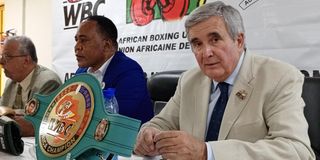Prime
ABU: boxing judges lectured on impartiality, accuracy

Cavalleri (R) also explained the 80:15:5 Rule. PHOTO/ABDUL-NASSER SSEMUGABI
What you need to know:
Cavalleri, who has handled 172 bouts as a referee since 1994, 240 as a judge since 1998 and 13 as an inspector since 2015, said he does not believe there’s a corrupt judge. Instead, judges lack concentration.
When DR Congo’s Jerry Kabongo fought Ugandan Disan Mubiru at the New Obligato, in January, most Ugandan fans were surprised that it ended in a draw, with two judges scoring it 57-57, and another 58-56 in favour of Mubiru, despite a superb performance by Kabongo.
Seven months later that controversial decision is still a reference for biased judging among boxing circles.
Yet when Kabongo returned to Kampala on August 10, he knew he had to be exceptionally good to win. And he was, battering Majid Kabonge throughout the six rounds. The Ugandan was just lucky to last the distance. Still, Kabonge was lucky to win by a split decision because one judge scored it 57-57.
Again, many were surprised by that judge’s bias for the home-based fighter. The kind of bias ring officials have been warned against if they have international ambitions.
“A good judge must look at boxers as just two athletes in the ring, not as champion vs challenger; hot prospect vs seasoned boxer; black vs white; home-based vs visitor, etc,” said experienced ring official Guido Cavalleri during the African Boxing Union (ABU) training course for judges at Hotel Africana Tuesday.
Cavalleri, who has handled 172 bouts as a referee since 1994, 240 as a judge since 1998 and 13 as an inspector since 2015, said he does not believe there’s a corrupt judge. Instead, judges lack concentration.
To drive his point home, he showed a video of a judge with an admirable level of concentration, keenly following every step the fighters make, and another of a judge who at times looked away during the fight.
“Try to ensure that you are in your best mental shape, and avoid all manner of distractions, including flattery from promoters, predictions of the fight in the media, or anything,” said Cavalleri, who was among the judges of Shakur Stevenson’s unanimous decision victory of the WBC lightweight title against Artem Harutyunyan on Jul 6, in New Jersey, USA.
A round is a match
Speaking French, the Italian instructor, aided by a Ugandan interpreter, advised his class: “Every round is a new match. Don’t think about the previous round or what might happen in the next rounds. Focus on the current round.”
ABU president Houcine Houichi, who is also a seasoned international ring official, chipped in: “Don’t get emotionally involved in the fight or else you will lose focus. And please don’t try to compensate for a boxer. Don’t feel sorry for any boxer. Even if he/she has lost all rounds it’s okay. Don’t impress the promoter or the home crowd.”
Houichi, who has suspended ring officials for making shoddy decisions, warned ring officials to be careful because their scorecards are uploaded on boxrec—the most reputable boxing database. “Let the winner in the ring be the winner on the scorecard,” he summed it up, as Cavalleri nodded in agreement.
Cavalleri also explained the 80:15:5 Rule, which stipulates that a professional boxing bout is scored 80 percent on efficient aggressiveness, 15 percent on ring leadership and defensive ability and five percent on pure aggressiveness.
Cavalleri and Houichi scrutinised some of these judges’ performance when Nara Promotions’ John Serunjogi took on Egyptian Ahmed Boloshy for the vacant African Boxing Union African Super Middle at Hotel Africana on Friday night.
CAVALLERI BRIEFLY
Referee: 172 bouts (since 1994-)
Judge: 240 bouts (since 1998-)
Inspector: 13 bouts (since 2015-)




